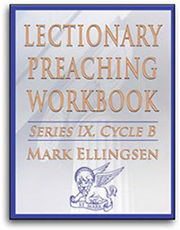SermonStudio
Proper 16 / Pentecost 13 / Ordinary Time 21
Preaching
Lectionary Preaching Workbook
Series IX, Cycle B
Theme of the Day
An almighty, caring God who dwells among us.
Collect of the Day
After recognizing how the word feeds the people with eternal life, petitions are offered that God direct our choices and preserve the faithful in truth that they may live in God. Same emphases as the Collect for the preceding Sunday.
Psalm of the Day
Psalm 84
* A Karah Psalm of Pilgrimage, in this case praising Mount Zion (in Jerusalem) as the goal for the pilgrim.
An almighty, caring God who dwells among us.
Collect of the Day
After recognizing how the word feeds the people with eternal life, petitions are offered that God direct our choices and preserve the faithful in truth that they may live in God. Same emphases as the Collect for the preceding Sunday.
Psalm of the Day
Psalm 84
* A Karah Psalm of Pilgrimage, in this case praising Mount Zion (in Jerusalem) as the goal for the pilgrim.


